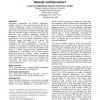Free Online Productivity Tools
i2Speak
i2Symbol
i2OCR
iTex2Img
iWeb2Print
iWeb2Shot
i2Type
iPdf2Split
iPdf2Merge
i2Bopomofo
i2Arabic
i2Style
i2Image
i2PDF
iLatex2Rtf
Sci2ools
107
click to vote
CHI
2008
ACM
2008
ACM
Do visualizations improve synchronous remote collaboration?
Information visualizations can improve collaborative problem solving, but this improvement may depend on whether visualizations promote communication. In an experiment on the effect of network visualizations, remote pairs worked synchronously to identify a serial killer. They discussed disparate evidence distributed across the pair using IM. Four conditions, respectively, offered (a) spreadsheet only (controls), (b) individual unshared visualizations, (c) view-only shared visualizations, and (d) a full-access shared visualization of all evidence. We examined collaborative performance, use of the visualization tool, and communication as a function of condition. All visualization conditions improved remote collaborators' performance over the control condition. Full access to a shared visualization best facilitated remote collaboration by encouraging tool use and fostering discussion between the partners. Shared visualization without full access impaired performance somewhat and mad...
CHI 2008 | Human Computer Interaction | Information Visualization | Visualization Tool | Visualizations Promote Communication |
Related Content
| Added | 12 Oct 2010 |
| Updated | 12 Oct 2010 |
| Type | Conference |
| Year | 2008 |
| Where | CHI |
| Authors | Aruna D. Balakrishnan, Susan R. Fussell, Sara B. Kiesler |
Comments (0)

